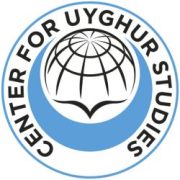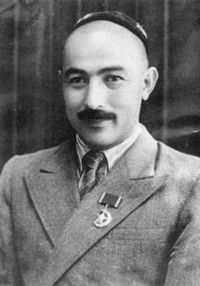Uyghur Figures – 06
Ahmedjan Qasim was a multifaceted leader, who played a pivotal role in the tumultuous times of East Turkistan. His journey was marked by dedication, wisdom, and an unwavering commitment to the cause of his people. His words and actions shaped a significant chapter in the region’s history.
As Ahmedjan Qasim embarked on his quest for the betterment of East Turkistan, he found himself at the heart of negotiations, strategic planning, and political discourse. In November 1945, he and a delegation of representatives left Urumchi to commence the second round of negotiations. Extensive discussions ensued, but a consensus remained elusive, prompting the delegation’s return to Ghulja. There, Rahim Jan Sabri presented a report on the second round of talks.
The representatives remained in Ghulja for a while to prepare for their return to Urumchi on December 25, 1945, for the third meeting. Just days later, on January 2, 1946, the two sides drafted an “11-point Agreement” to resolve the armed conflict and promote reconciliation.
On January 16, 1946, following the decision of the East Turkistan government, a “Committee for Voluntary Aid to the Needs of Soldiers on the Battlefronts” was formed, with Ahmedjan Qasim elected as its chairman.
While the Free East Turkistan Government deliberated on the treaty project, Ahmedjan Qasim took on additional responsibilities. He authored articles addressing pressing issues in the contemporary landscape. On May 25, 1946, during an extensive meeting of the East Turkistan government members, he delivered a comprehensive explanation of the “11-point Agreement” signed with the Central Kuomintang government.
After thorough discussions among the members, it was resolved: “The 11-point Agreement and its appendices presented by our representatives, Ahmedjan Sabri, Abu Al-Khair Turi, and Ahmedjan Qasim, are reasonable, and our representatives are authorized to sign the treaty with the Central Kuomintang government.”
According to this decision, they returned to Urumchi for the third time and signed a peace treaty with the Central Kuomintang government on June 6, 1946. Article 9 of the treaty mandated the formation of a federal government in East Turkistan, composed of 15 members from Turkistani ethnic groups and 10 members from the Central Kuomintang government.
As per the treaty, Ahmedjan Qasim represented the East Turkistan government as the Vice President, with Abdukerim Abbasov as the Deputy Head of Security, Sayfuddin Azizi as the Minister of Education, Rahimjan Sabiri as the Deputy for Internal Affairs, Delikan as the Minister of Health, and Abu Al-Khair Turi, Osman, and Ishaq Bek as members of the government.
In November 1946, the regional union government announced a list of 24 individuals to represent the East Turkistan government at the National Political Consultative Conference, which would be held in Nanjing.
The National Political Consultative Conference took place in Nanjing, and Ahmedjan Qasim represented East Turkistan’s delegation, presenting their proposals. His address emphasized the paramount importance of achieving equality and implementing populist policies. He stated that the self-governance they sought was not about granting supreme power to the Uyghurs or any specific group within their province but about ensuring equality for all ethnic groups and full implementation of populist policies.
However, upon their return to Urumchi in January 1947, they found the situation in turmoil. The federal government, which had not been established for a long time, was facing significant challenges. Given this unstable situation, Ahmedjan Qasim delivered a speech at the Uyghur Association Club on February 17, 1947. In his speech, he called on people to raise their awareness and cautioned them against the conspiracy of corrupt individuals attempting to undermine the Peace Agreement through propaganda.
In May 1947, when Masud Sabri Efendi became the head of the government, the federal government disintegrated entirely. The representatives of the East Turkistan government returned to Ghulja, accompanied by intellectuals and progressives who had come to Urumchi from the seven provinces.
Upon returning to Ghulja, Ahmedjan Qasim reflected on the past and delved deeply into the future. He conducted extensive studies, authored numerous political articles, and held meetings covering various fields, sharing his insights into the international landscape and East Turkistan’s position.
He recognized the necessity of having a revolutionary party composed of individuals from all ethnicities and walks of life in East Turkistan. This party would be capable of safeguarding the people’s fundamental interests, possessing strength, adapting to different eras, and preserving and promoting populism and the populace.
Hence, the “Democratic Alliance for the Protection of the Populace and Populism” was established. This initiative received support from both public and secret organizations operating throughout East Turkistan. Therefore, on August 8, 1948, Ahmedjan Qasim convened a conference with representatives from all regions and districts of East Turkistan to facilitate the organization’s formation and elect its executive council members. He was unanimously elected as the organization’s president, serving as its principal official.
Ahmedjan Qasim spoke about the role of the “Democratic Alliance for the Protection of the Populace and Populism”:
“To achieve our people’s freedom and enhance the triumph of the national liberation movement, those who believe in populism as the only path must support our liberation movement. We will not succeed in our national liberation struggle without engaging in a fierce battle against imperialism and colonialism alongside the people. However, the road to victory cannot be considered a straightforward, obstacle-free, and smoothly paved path. On the contrary, the more the revolutionary power of the people triumphs, the more the black reactionary forces obstruct, requiring us to remove these obstacles with the people’s strength. Based on the experience and lessons learned from liberating North East Turkistan to the Saima Agreement, it is evident that we need an organization like this. This is why populist intellectuals with progressive thinking gathered in the city of Ghulja and formed this political organization. Our organization should organize the people and lead them to political consciousness, preparing everyone to be always ready to fight for the people’s interests. We must also lead them in a radical struggle against colonial and imperial policies. It is imperative to support a policy that provides freedom and equal rights for all ethnic groups in East Turkistan and struggle tirelessly to strengthen ethnic unity. We must also fight to preserve the fruits of our national liberation movement, expand it, and be prepared to make sacrifices to the end of the national liberation path.”
Ahmedjan Qasim emphasized the paramount importance of providing comprehensive education, primarily to educate the young generation, the bearers of the future. He stressed the need for teachers to be concerned with this cause.
Ahmedjan Qasim, addressing teachers, stated:
Dear teachers! Among your essential tasks is to train future leaders of the state and future social specialists comprehensively, instilling the values and principles of the future society. Therefore, it is necessary to first understand the purpose of training and then execute it correctly. You should know that education is an immensely important issue. If education is carried out in the most advanced way within society, according to the populist theories envisioned by thinkers, the youth who support the people’s cause will be nurtured. If the state system aligns with the stages of social development, the suitable ideology for the state will serve as the foundation, and youth will be raised accordingly. The state should transcend social classes. Wherever retrogressive and authoritarian forces rule the state, the educational approach should align with the interests of the people to steer it against the spirit of populism. Education is closely related to politics, where politics determines the goals and objectives of education. You must make efforts to provide young people with a complete scientific education. You should also teach mathematics, physics, chemistry, geology, and other subjects proficiently so that the youth become knowledgeable and know how to use technological tools and harness nature for the benefit of society.
In the eyes of many, Ahmedjan Qasim emerged as a true leader, acquiring comprehensive knowledge and wisdom. He embodied versatility and humility, assuming various roles as needed—be it a driver when behind the wheel, a diver when in the sea, a worker in the mines, a farmer on the fields, a craftsman, or a skilled shepherd among shepherds.
His daily routine was a blend of sports, work, political studies, and language studies. He maintained proficiency in multiple languages, and his daily diary meticulously documented his life’s events.
Despite his multifaceted abilities and contributions, Ahmedjan Qasim did not perceive himself as distinct or separate from others. When he traveled with his colleagues, he dressed simply as a driver to maintain a low profile. Consequently, many people in the places he visited did not recognize him, often assuming he was just a driver. He consistently emphasized the importance of serving the people with honesty and sincerity.
Ahmedjan Qasim personally greeted people who came to him with any concerns. If he could resolve their issues immediately, he did so; otherwise, he directed them to the relevant authorities. No department or official was exempt from handling such matters.
Tragically, on the evening of August 22, 1949, Ahmedjan Qasim, along with General Ismail Bek, General Delikan, Abdul Karim Abbasov, Abdul Rashid Amenuv, Abdul Ghayy Kurim, and Osman Jan Ashurnia, embarked on a journey to the People’s Republic of China to participate in the inaugural session of the Political Consultative Council of the National People’s Congress. As they traversed over mountain ranges and dense forests, their plane crashed, resulting in the martyrdom of Ahmedjan Qasim and other prominent leaders, as asserted by the Soviet Union and China. However, some historical accounts suggest they were executed by Stalin in Moscow.
Written by Taib Jan Hadi and Abdul Shakoor Mohammad
Copyright Center for Uyghur Studies - All Rights Reserved

